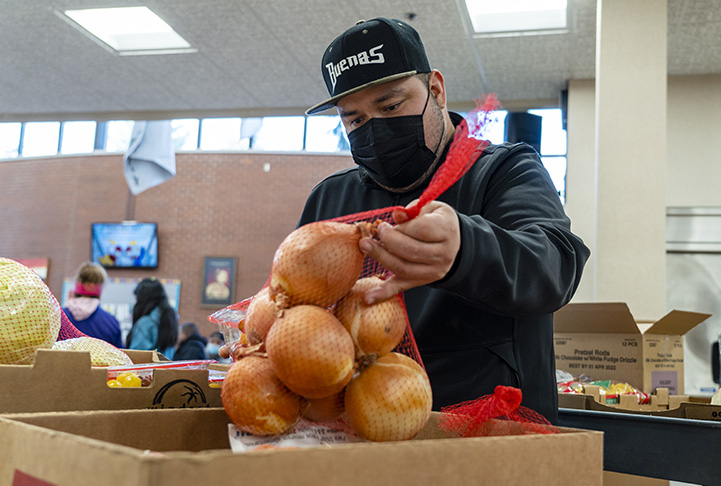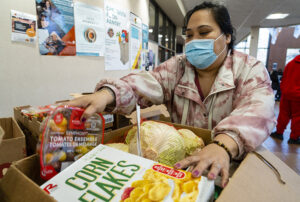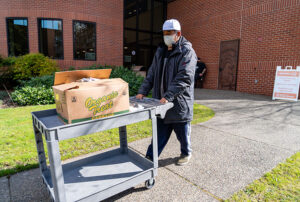Mobile pantry helps Micronesian Islander neighbors

Kiko shops for food during a mobile pantry distribution held with Micronesian Islander Community at Chemeketa Community College.
On a recent Saturday morning, a community building at Chemeketa Community College is abuzz with activity.
The mellow sounds of a Fijian reggae artist fill the air as people exchange greetings and laughs — and fill grocery bags with a selection of fresh produce, shelf-stable items, and frozen foods from Marion Polk Food Share’s mobile pantry.
It’s one of a monthly series of events hosted by Salem-based Micronesian Islander Community (MIC) in partnership with the Food Share, part of an initiative to help increase food security for Micronesian and Pacific Islander natives.
The monthly event also includes COVID-19 vaccination and testing, assistance in enrolling in the Oregon Health Plan, and services from notaries who speak their native languages —the latter a vital service to a community that faces language barriers when seeking resources. Attendees speak at least 10 different languages, and some are hesitant to pursue services due to communication difficulties.

Kapiolani shops for food during a mobile pantry distribution held in partnership with Micronesian Islander Community.
“Not only do we have food boxes, we also provide culturally specific support, like language support,” says Jackie, MIC’s director. “We’re trying to reduce barriers to access and even increase accessibility. We want people to know about all the programs and services available, instead of them having to figure it out on their own.”
Kapiolani, an MIC community health worker and a mobile pantry client, says the mobile distributions are conveniently located for the Micronesian Islanders, many of whom live nearby and do not have convenient access to transportation. Another benefit: The ability to receive as much food as is needed to feed large households.
“Some people have three, four, five families in one household, and it’s hard for them to feed everybody,” Kapiolani says. “Coming here and getting as much food as they need really helps a lot.”
The Food Share’s partnership with MIC began with a produce program in 2019. When the pandemic started, the Food Share teamed with MIC to hold Farmers to Families Food Box distributions for their community, which was severely impacted by COVID-19.
“We’re a small community, but we have high numbers of death and long-term health complications,” Jackie says. “We’ve lost community leaders, elders, and even our clan chief, who passed away from COVID complications. So we’ve been really mindful about trying to get out COVID tests and vaccines.”

Santauo takes a box of food to his car during a mobile pantry distribution at Chemeketa Community College.
When the federal food box program ended in 2021, the Food Share started bringing the mobile pantry to MIC’s monthly events. The transition from pre-made food boxes to a shopping style is working extremely well.
“People are able to shop for what they need, and what’s being offered is amazing,” Jackie says. “They are very enthusiastic because they get to choose what they want.”
Through the program, the Food Share makes it a priority to get nutritious food to the community and to reach areas and populations that are underserved.
For people like Kiko, an MIC volunteer who took a break from handing out prepared meals to shop for food, the mobile pantry has made a real difference for his household, particularly with rising food costs.
“Things are expensive and there’s stuff we can’t afford,” he says. “Times are hard right now. Having this food really helps us out.”
We can’t thank you enough for your care and compassion for communities like MIC and families like Kapiolani’s and Kiko’s.

